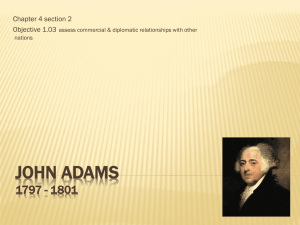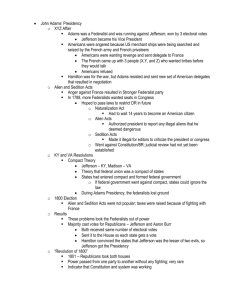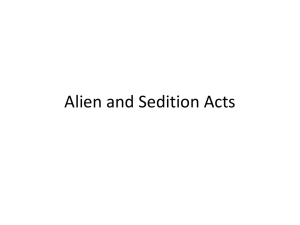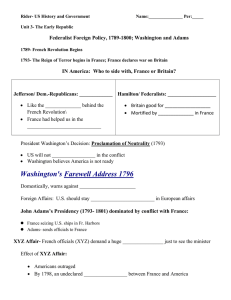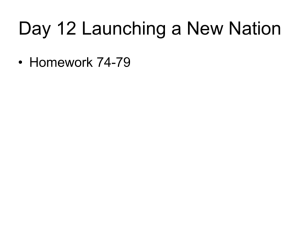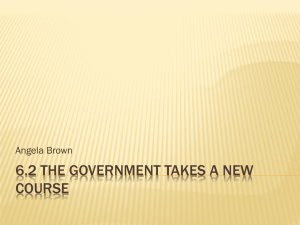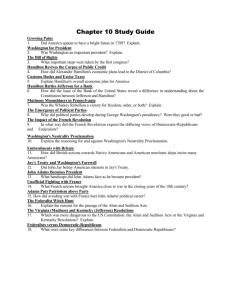6.2 The Government takes a new course
advertisement
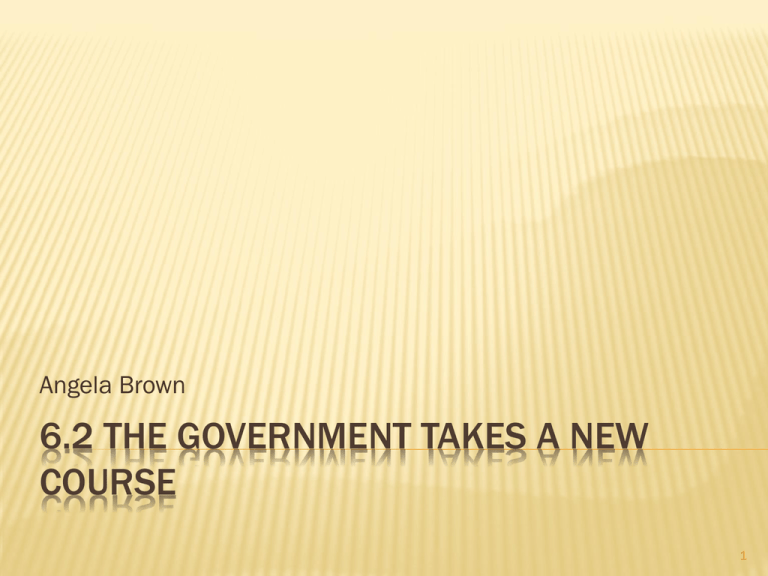
Angela Brown 6.2 THE GOVERNMENT TAKES A NEW COURSE 1 LEARNING TARGETS: 1. 2. 3. Summarize the actions of John Adams as President. Describe the events of Gabriel Prosser’s Rebellion. Explain the outcome and the importance of the election of 1800. 2 FOCUS: Bellringer: Rate on a scale of 1 – 5 with 5 the highest the importance of the following conditions to presidential campaigns: Length of the campaign honesty of the campaign, relevance of issues raised during the campaign Key Terms: XYZ Affair Alien and Sedition Act Virginia and Kentucky Resolutions nullification 3 JOHN ADAMS Despite having served as a leader during the American Revolution and as the Vice President for eight years, John Adams lacked the prestige of George Washington. As President, Adams faced the differences were growing wider and wider. He also faced the threat of war from abroad. From the beginning of the Adams administration, the U.S. began to drift toward war with France. The French were angry about Jay’s Treaty with the British and began seizing American ships in French harbors. Trying to avoid war, Adams sent officials to Paris to negotiate with the revolutionary government. 4 THE XYZ AFFAIR Once in Paris, the American officials were met by secret agents sent by the French foreign minister. These agents were later identified only as X, Y, and Z. They demanded a bribe of $250,000 and a loan to the French of $10 million before the Americans would even by allowed to see the French foreign minister. This was common practice in European diplomacy but outraged the Americans and became known as the X, Y, Z Affairs. 5 THE X,Y.Z AFFAIR The diplomats refused to pay and returned home. The slogan “Millions for defense, but not one cent for tribute (bribery)” rang out in the U.S. By 1798 the French and U.S. engaged in an undeclared war firing on and seizing each other’s ships. 6 THE ALIEN AND SEDITION ACTS The federalists took advantage of the war crisis and Adam’s popularity to push important new measures through Congress. An increase in the size of the army, higher taxes to support the army and navy, and the Alien and Sedition Acts of 1798 were a few. 7 ALIEN AND SEDITION ACTS Under the Alien Act, the President gained the right to imprison or deport citizens of other countries residing in the U.S. Under the Sedition Act, persons who wrote, published or said anything “of a false, scandalous, and malicious” nature against the American government or its officials could be fined or jailed. You had to be able to proved everything you said. The Federalists used the Sedition Act to silence Republican opposition. Ten Republicans were convicted and many others were tried. 8 THE VIRGINIA AND KENTUCKY RESOLUTIONS Jefferson, Madison, and other Republicans believed that the Sedition Act violated the constitutional protection of freedom of speech. The Constitution did not state who had the authority to determine constitutionality. 9 VIRGINIA AND KENTUCKY RESOLUTIONS Jefferson and Madison believed that the states should make that judgment. They responded with the Virginia and Kentucky Resolutions. They stated, if a state decided that a law was unconstitutional, it could declare that law “null and void” within the state. This principle of nullification remained unresolved. Neither Virginia nor Kentucky tried to enforce the resolutions. Their defiance of federal power was clear. 10 INCREASING TENSIONS Tensions between Federalists and Jeffersonian Republicans continued to grow during the late 1790s. Members of Congress attacked each other in the House. Crowds taunted President Adams, at times forcing him to enter the presidential residence in Philadelphia through the back door. With the election of 1800 looming, many people believed the future of the U.S. was at stake. 11 GABRIEL PROSSER’S REBELLION In the area around Richmond, Virginia, a blacksmith named Gabriel Prosser and several other slaves planned a rebellion. The leaders intended to take over Richmond and win freedom. The small-scale rebellion failed. The rebels were caught and tried, and at least twenty of them, included Prosser, were executed. 12 THE ELECTION OF 1800 The election of 1800 was a nasty campaign. Jeffersonian newspapers accused Adams of being a monarchist…a terrible insult at the time. Federalists asserted that Jefferson was a godless man who would lead the United States into chaos. 13 THE ELECTION OF 1800 Jefferson won the popular vote in December 1800. He was unable to get a majority in the Electoral College so the House would have to choose the new President. Though Jeffersonians had won most of the seats they had not yet entered office. The vote would be taken by the Federalists controlled House. 14 JEFFERSON AS PRESIDENT Even before the voting began it was clear that no candidate could get a majority immediately. The House finally elected Jefferson as the their President on the thirty-sixth ballot. 15 WHY ADAMS LOST Adams defeat was in a way an unfair judgement of his abilities. Adams was more devoted to public service and, some historians believe, more honest than most Presidents. Rising above Federalist hostility to France, he had sent a second diplomatic mission to that country in 1799. This mission had cooled tensions between the U.S. and France considerably. Like most decisive Presidents, however, Adams failed to quiet his critics and angered many of his supporters. 16 WHY JEFFERSON WON By 1800 Thomas Jefferson was the clear leader of those who prefered local to national government. Jefferson and his followers believed it was better to risk too much liberty than suffer from too much government. Jefferson always denied that he was a politician. He never saw himself as working to build a permanent political party. This is exactly what he did. 17 A PEACEFUL TRANSFER OF POWER In 1801 Washington D.C. designed by L’Enfant to feature broad boulevards and Roman buildings, was a swamp with muddy, rutted roads and half-completed structures. With Jefferson’s inauguration, the Federalist leaders proved they would step down and let the Jeffersonian Republicans take over. Jefferson recognized the significance of this peaceful transfer of power. 18 EXIT SLIP 1. Why was the election of 1800 significant in the history of the United States? 2. Create a list of the Federalists’ actions that angered many Americans and caused them to elect Jeffersonian Republicans in 1800. 3. How does the Sedition Act reflect the Federalists’ position in the controversy between those who favored liberty and those who favored order? 19
